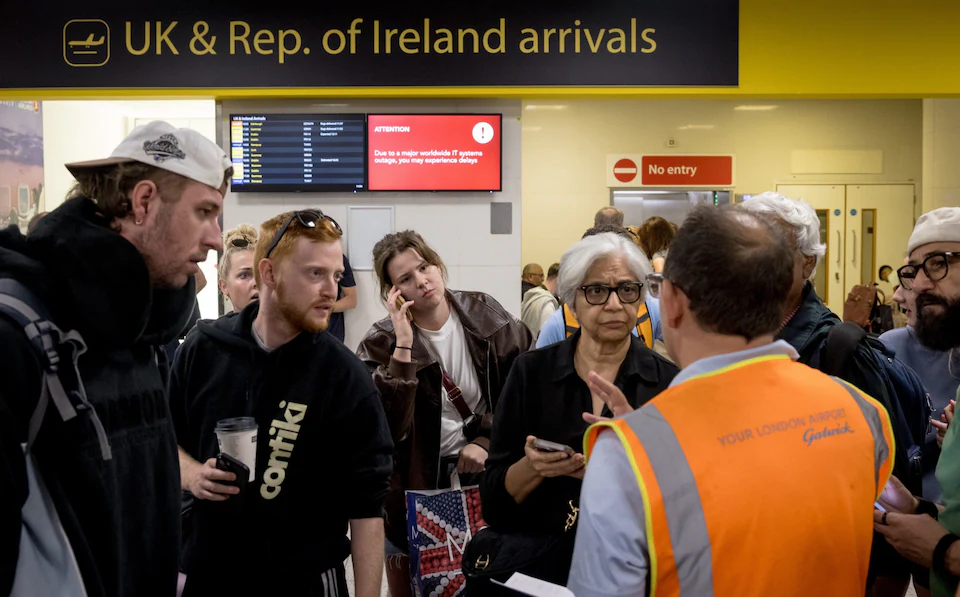Hundreds of thousands of people have had their foreign summer holidays thrown into jeopardy by a global IT outage that caused chaos at Briti
Hundreds of thousands of people have had their foreign summer holidays thrown into jeopardy by a global IT outage that caused chaos at British airports on Friday.
Around 200,000 people are set to be hit by delays and cancellations caused by the IT meltdown, which was triggered by a faulty update to a widely-used piece of cyber security software. Many travel insurers are refusing to pay to rearrange holidays.
NHS services, train services, cash machines and contactless payments were also taken offline, with 999 services facing long delays after GP surgeries were unable to make appointments.
The worldwide IT outage was caused by a glitch in cyber security software made by CrowdStrike, a US company, which caused millions of computers running Microsoft’s Windows to crash suddenly on Friday morning.
It resulted in a so-called “blue screen of death”, sending the computers into recovery mode.
An emergency meeting of Cobra officials was called to address the chaos, and Louise Haigh, the Transport Secretary, said her department was “working at pace with industry and across Government on the issue”.
While most of the technical problems were resolved by Friday night, the impact on summer holidays is expected to last for days.
Friday was scheduled to be the busiest day at British airports since October 2019 as schools broke up for the summer holidays.
As 5,078 flights were cancelled globally on Friday, including around 160 UK flights, passengers were hit with queues of more than three and a half hours.
Staff at airports from Heathrow to Bangkok were forced to manually check-in travellers after the technical glitch sent their systems into meltdown. Edinburgh Airport halted all arriving flights for around two hours on Friday as aircraft backed up on the tarmac.
Meanwhile, Ryanair urged passengers to leave airports, saying: “If your flight has been cancelled, we kindly request that you leave the airport as the IT outage means we cannot currently assist passengers at the airport.”
Delta and United Airlines both imposed so-called ground stops on Friday morning, preventing flights from taking off while airline staff rushed to fix crippled computers.
The disruption is set to carry on into next week as airlines struggle to get aircraft and pilots back into position to run their scheduled services.
Passengers who have had their flights cancelled also face problems if trying to recoup lost costs from travel insurers, as many do not cover accommodation if travel is disrupted. MoneySuperMarket, the comparison site, confirmed that there were likely to be hundreds of travel policies that would not provide any cover for Friday’s events.

Disruption is set to carry on into next week as airlines struggle to get aircraft and pilots back into position for scheduled services
Paul Charles, a travel expert, said: “It will take until Monday to recover. It’s turmoil that the industry doesn’t need on one of the busiest weekends of the year.”
Mr Charles estimated that 25,000 people were directly affected by the cancellation of nearly 300 flights to and from the UK.
Airlines are responsible for arranging a replacement flight but may struggle to accommodate people, with travel experts warning that most flights were already expected to be fully booked.
Travellers hoping to rebook their own travel faced having to arrange their own transfers, with routes to some popular destinations, such as Athens, no longer having direct flights available.
George Kurtz, the CrowdStrike chief executive, told NBC, the US broadcaster, he was “deeply sorry” for the fault and admitted it would be “some time” before all the problems were resolved. He confirmed that the incident was not a cyber attack.
CrowdStrike’s software is widely used by businesses and is designed to protect companies from hacking, but a broken file included within a routine update to the technology almost immediately broke Windows computers that had the programme installed.
In a technical statement, the company said a “sensor configuration” had “triggered a logic error” which has since been fixed. But IT experts warned that many businesses were having to manually repair their computer systems.
GP surgeries in Britain were unable to access patient records or book appointments, with the NHS advising people only to contact a doctor if their ailment was urgent.
Cancer appointments were cancelled at some hospitals as radiology departments were hit by the outage, and some NHS systems remained down on Friday evening. The National Pharmacy Association warned that disruption was likely to continue through the weekend, even when systems were back online, as outlets dealt with a backlog of medicine deliveries.
Holidaymakers hoping to use the railways for a getaway were also hit by the disruption. Thameslink, Southern Rail and Gatwick Express faced “widespread IT issues across our entire network” that left bosses unable to tell drivers which trains they were meant to be working on.
South Western Railway said all its ticket machines had stopped working on Friday morning. National Rail Enquiries advised passengers to “purchase your ticket online, on the train or speak to a member of station staff”.
On the high street, card payment systems at Waitrose and Gail’s, the bakery chain, stopped working, with staff having to take cash instead.
The London Stock Exchange’s in-house news service went offline, while Sky News was forced to pull its morning broadcast and replace it with pre-recorded footage.
Adam Leon Smith, a cyber security expert at the British Computer Society, said it could take “days and weeks” for some companies to get back online, while Ciaran Martin, a former head of GCHQ’s National Cyber Security Centre, estimated that the economic damage from the glitch would “run into the billions”.
Microsoft deputy chief information security officer Ann Johnson described the outage as “a very major issue” and could not predict how long it would take for all services to be restored.
Source: The Telegraph
COMMENTS